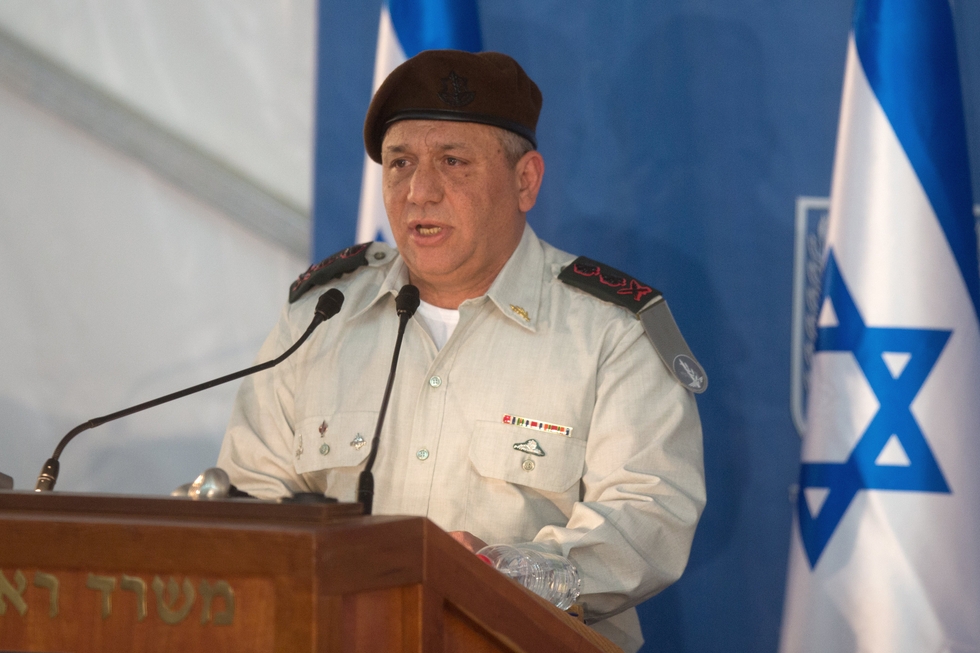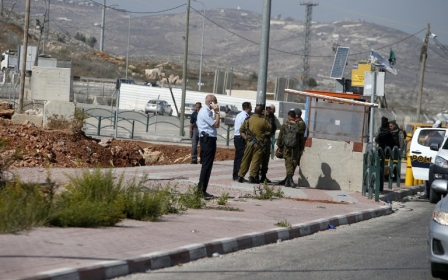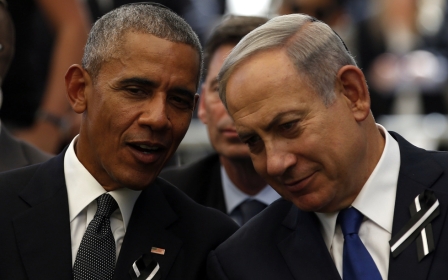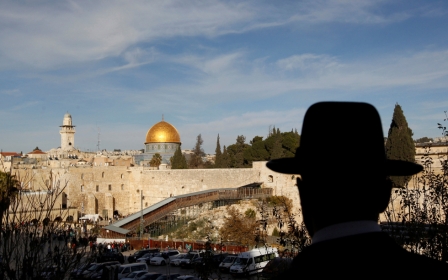The peaceniks in Israel's highest echelons

Four months ago, Israeli Knesset member David Bitan provoked uproar when he accused the chiefs of Israel’s military and intelligence agencies of being “lefties”.
A coalition whip and one of the more vociferous members of Prime Minister Benjamin Netanyahu's ruling Likud party, Bitan is also a newcomer to national politics who wanted to impress party loyalists and his supporters.
Despite the uproar, his words echo the sentiments of many right-wing Israelis, who wonder what it is about Mossad and the army that makes its chiefs express moderate views when it comes to Israel's foreign and security policies.
On the surface, it seems like a contradiction in terms. The popular notion is that generals and security chiefs are warmongers. Their profession is to fight and lead their subordinates to battles. They must love war.
But this impression is a false one, at least as far as Israel is concerned, though it can be evident in other countries, too.
The faultline
Like many events in Israel’s history, the formative turning point came after June 1967 following the Six Day War, in which Israel captured the West Bank from Jordan, Gaza from Egypt and the Golan Heights from Syria.
Until then, it would be fair to say that Israel was a homogenous and coherent society. Its people believed in its righteous cause and rallied around the government and its policies without any doubts.
But with the taking of these territories, along with their mostly Palestinian inhabitants, Israel turned into an occupying force and a politically and ideologically divided society. These first cracks soon spread from civil society and politics to the security establishment.
General Matti Peled was the first swallow. A longtime proponent of tough measures against Palestinians, he became in the 1970s and 1980s a peace activist and a member of the Knesset advocating reconciliation between Israel and the Arab states.
He was among the first Israelis to meet PLO officials including Yasser Arafat, when such meetings were illegal in Israel. Later, more generals and security chiefs walked in Peled's footsteps. Hundreds of them created a unique body called The Council for Peace and Security.
Vocal critics ... out of office
These cracks have widened as Netanyahu’s grip on power has cemented over the past few years, and especially as it has become increasingly clear that, despite his rhetoric and public statements of commitment to the two-state solution, his true intention is to run away from peace negotiations and consolidate Israeli control of the West Bank.
There are two memorable moments in the growing gap between the government and the top echelons of the security establishment. The first was when the documentary The Gatekeepers was released in 2012.
The film shows interviews with six former heads of Shin Bet, the domestic security service which is in charge of counter-terrorism and investigations but which, together with the army, effectively controls the daily lives of Palestinians under occupation.
Five out of the six chiefs criticised both the occupation and consecutive Israeli governments for their short-sighted policies of building Jewish settlements and thus torpedoing the chance of peace. Their views were mind-boggling.
However, the question the film director didn’t ask is "Where have you been? And why, while in office, didn’t you advise and implement the policy which you now advocate after leaving your posts?"
The second, even more important, event was the opposition that Mossad head Meir Dagan and Chief of Staff Lt-General Gabi Ashkenazi expressed in 2009-2010 to efforts by Netanyahu and then defence minister Ehud Barak to provoke a situation which could lead to war between Israel and Iran.
Netanyahu and Barak asked the security chiefs - in unoffical meetings - to mobilise the army so as to lead Iran to believe that it was on the verge of an immediate attack, thus taunting it into making pre-emptive moves. But Dagan and Ashkenazi sensed that the real plan was to trigger a chain reaction which would have dragged the US into attacking Iran’s nuclear sites.
Dark forces out, weapons systems in
The simple explanation as to why security chiefs position themselves as moderates is because warriors know from first-hand experience the cost and horrors of war, and try to avoid and prevent it. There is, however, much more to the question.
Israeli society has been changing over the past decade under Netanyahu’s leadership. The Western democratic values and human rights which Israel has always prided itself on have been eroded.
Right-wing ideas of nationalism and religiosity, of the “enemy within,” intolerance to dissent and minority voices, attempts to control the media and to ostracise civic groups are sweeping the nation. They threaten to infiltrate the military.
Security chiefs know that one of the strongest and most effective pillars of their mission as guardians of Israeli security is cooperation from their US and other Western counterparts. They also know that if the dark forces and ideas infiltrate the security establishment, it will make their job much more difficult.
Internationally, the erosion of Israel's democratic values will leave Israel and the military seen as dark forces drifting away from the shared common Western behaviour that has so far characterised the country - this will thus undermine cooperation with their counterparts.
It could well lead the West - and especially the US, Israel's most important supporter - to cut back that cooperation and the supply of sophisticated weapon systems.
'Bunch of gangs'
Domestically, if politicised, right-wing notions dominate the spirit of the Israel Defence Forces and the intelligence agencies, sooner or later, they will turn from highly professional bodies to a “bunch of gangs” as former defence minister Moshe Yaalon has warned.
In that sense, the current Chief of Staff Lt-General Gadi Eisenkot is another gatekeeper shutting out the bad winds blowing across the country. Metaphorically, he is like the little Dutch boy with his finger in the dam who tries to prevent the flood.
He conducts a rear-guard battle to prevent national-religious ideas from entering the IDF and invading its ethos and code. He tried to do this by teaching and preaching to his subordinates to be professional soldiers adhering to the army's laws, and its orders on rules of engagement and opening fire.
In the absence of peace negotiations with the Palestinian Authority, he is also doing everything possible to minimise the friction between the military and the Palestinians and minimise casualties. Like his predecessors, he knows very well that Israel needs peace for its security and that it can't lean forever on its sword.
His problem, though, is the same as that which faced his predecessors: Netanyahu and his right-wing coalition don’t listen to them. Instead they conspire to replace them with “one of us”.
Once the symbol of the Israeli mainstream and of consensus, the military chiefs, under his government, have been dwarfed in image. They are less appreciated by the public and have waning influence. And like politics and the media, it is one more sphere that Netanyahu wants to dominate and paint in political colours.
- Yossi Melman is an Israeli security and intelligence commentator and co-author of Spies Against Armageddon.
The views expressed in this article belong to the author and do not necessarily reflect the editorial policy of Middle East Eye.
Photo: IDF Chief of Staff Lt-General Gadi Eisenkot (AFP)
New MEE newsletter: Jerusalem Dispatch
Sign up to get the latest insights and analysis on Israel-Palestine, alongside Turkey Unpacked and other MEE newsletters
Middle East Eye delivers independent and unrivalled coverage and analysis of the Middle East, North Africa and beyond. To learn more about republishing this content and the associated fees, please fill out this form. More about MEE can be found here.





